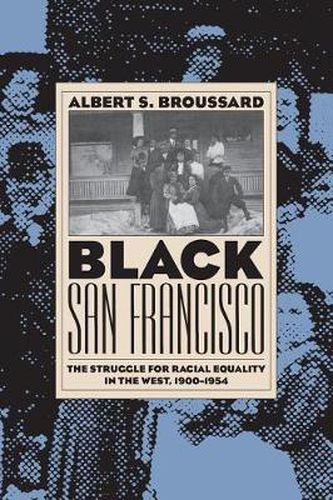Readings Newsletter
Become a Readings Member to make your shopping experience even easier.
Sign in or sign up for free!
You’re not far away from qualifying for FREE standard shipping within Australia
You’ve qualified for FREE standard shipping within Australia
The cart is loading…






This title is printed to order. This book may have been self-published. If so, we cannot guarantee the quality of the content. In the main most books will have gone through the editing process however some may not. We therefore suggest that you be aware of this before ordering this book. If in doubt check either the author or publisher’s details as we are unable to accept any returns unless they are faulty. Please contact us if you have any questions.
By 1867 black San Franciscans had gained access to public transportation. In 1869 they were granted the right to vote by the state of California. In 1875 they fought for desegregated schools and won. Yet in 1957, Willie Mays was initially denied the opportunity to purchase a home in an exclusive San Francisco neighborhood because he was black. In Black San Francisco, Albert Broussard explores race relations in a city where whites, for the most part, were outwardly civil to blacks while denying them employment opportunities and political power. Understanding the texture of the racial caste system, he argues, is critical to understanding why blacks made so little progress in employment, housing, and politics despite the absence of segregation laws.
When it came to racial equality in the early twentieth century, Broussard argues, the liberal progressive image of San Francisco was largely a facade. Illustrating how black San Franciscans struggled to achieve equality in the same manner as their counterparts in the Midwest and East, he challenges the rhetoric of progress and opportunity with evidence of the reality of inequality for black San Franciscans.
Black San Francisco is considerably broader in scope than any previous study of African-Americans in the West. It provides extensive coverage of the city’s black community during the Great Depression and the New Deal, details civil rights activities from 1915 to 1954, and provides extensive biographical material on local black leaders.
In his reconstruction of the plight of San Francisco’s black citizens, Broussard reveals a population that, despite its small size before 1940, did not accept second-class citizenship passively yet remained nonviolent into the 1960s. He also shows how World War II was a watershed for Black San Francisco, bringing thousands of southern migrants to the bay area to work in the war industries. These migrants, in tandem with native black residents, formed coalitions with white liberals to attack racial inequality more vigorously and successfully than at any previous time in San Francisco’s history.
$9.00 standard shipping within Australia
FREE standard shipping within Australia for orders over $100.00
Express & International shipping calculated at checkout
This title is printed to order. This book may have been self-published. If so, we cannot guarantee the quality of the content. In the main most books will have gone through the editing process however some may not. We therefore suggest that you be aware of this before ordering this book. If in doubt check either the author or publisher’s details as we are unable to accept any returns unless they are faulty. Please contact us if you have any questions.
By 1867 black San Franciscans had gained access to public transportation. In 1869 they were granted the right to vote by the state of California. In 1875 they fought for desegregated schools and won. Yet in 1957, Willie Mays was initially denied the opportunity to purchase a home in an exclusive San Francisco neighborhood because he was black. In Black San Francisco, Albert Broussard explores race relations in a city where whites, for the most part, were outwardly civil to blacks while denying them employment opportunities and political power. Understanding the texture of the racial caste system, he argues, is critical to understanding why blacks made so little progress in employment, housing, and politics despite the absence of segregation laws.
When it came to racial equality in the early twentieth century, Broussard argues, the liberal progressive image of San Francisco was largely a facade. Illustrating how black San Franciscans struggled to achieve equality in the same manner as their counterparts in the Midwest and East, he challenges the rhetoric of progress and opportunity with evidence of the reality of inequality for black San Franciscans.
Black San Francisco is considerably broader in scope than any previous study of African-Americans in the West. It provides extensive coverage of the city’s black community during the Great Depression and the New Deal, details civil rights activities from 1915 to 1954, and provides extensive biographical material on local black leaders.
In his reconstruction of the plight of San Francisco’s black citizens, Broussard reveals a population that, despite its small size before 1940, did not accept second-class citizenship passively yet remained nonviolent into the 1960s. He also shows how World War II was a watershed for Black San Francisco, bringing thousands of southern migrants to the bay area to work in the war industries. These migrants, in tandem with native black residents, formed coalitions with white liberals to attack racial inequality more vigorously and successfully than at any previous time in San Francisco’s history.